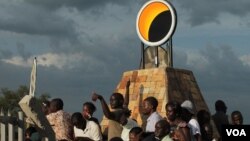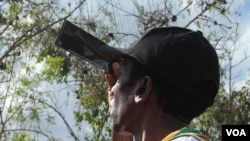PAKWACH, UGANDA —
A total solar eclipse on Sunday thrust the small Ugandan town of Pakwach into the international spotlight, as one of the best places in the world to view it. The event has transformed the town, though not everyone thinks it is for the better.
Before Sunday, few people outside Uganda had heard of Pakwach. With a dusty collection of bars and shops lining the road, Pakwach has always been little more than a pit stop for any tourist who makes it to the remote northwest.
Over the weekend all of that changed, however, as Pakwach became the best place in Uganda - and some say in the world - to view a spectacular total solar eclipse.
The Ugandan government had predicted that tens of thousands of visitors would descend on Uganda for the event. Stephen Wakunga, Pakwach’s town clerk, said the town has been preparing for months - painting facades, improving sanitation and hastily finishing buildings that had sat half-built for years.
“Although we are going to be overwhelmed by the number of visitors that will come, we want to see that sanitation and hygiene is highly maintained. So that the town, although it’s a small one, looks healthy to live in,” said Wakunga.
New commerce streams
Thanks to the eclipse, Pakwach also now has a brand-new hotel and the region’s only tourist information center. The town is hoping it will attract tourists even after the sun reappears, according to Wakunga.
“There are some cultural location sights that, because of this event, are going to be developed to attract tourists, and some fall within this town. I hope that it will boost our local revenue, definitely,” he said.
But fears of another Westgate-style attack meant that the carnival atmosphere was somewhat dampened by heightened security.
Harriet Apili, a Pakwach resident, said heavy-handed police tactics have been making life hard for weeks. “Now when you come out you find these policemen, they are asking you where you’re going, making the life of the locals kind of difficult.”
Plus, she added, prices have risen beyond what some local residents can afford. “It’s a benefit to the business men and women, and a problem to the buyers. For example, the price of fish used to be at 15,000, but now it has doubled up to 30,000 because of the eclipse,” she said.
There were real health risks, as well. Many feared that villagers in this remote corner of Uganda might not understand the danger of staring directly at the sun, and that thousands could damage their eyes.
Doctors in the local heath center say they spent weeks going from village to village, warning people not to look at the sun. Knowing villagers would not have access to eclipse glasses, they told them to view the eclipse through strips of developed film or black plastic bags.
Health concerns
Apili, who works in surrounding villages, said many people feared more than just going blind. “They are saying now that if there is going to be total darkness then they are afraid it might be the end of the world. God has gotten angry at people and is trying to end the world. That is now what they are using to preach the gospel.”
As the sky darkened on Sunday and the sun was transformed into a glowing ring of fire, though, the mood among the those gathered around Pakwach was mostly one of wonder and excitement.
“What I came purposely to see, I have seen it. It was very nice, and it was fantastic,” said one viewer, as the gathered crowd of observers cheered.
People watched the eclipse through everything from bits of cellophane to wrapping paper. Most used methods that were not officially recommended.
Doctors say they have not yet had any patients with damaged eyes. But one local doctor pointed out that it may take time for villagers to come forward, and that they are still preparing to treat people if they do.
Before Sunday, few people outside Uganda had heard of Pakwach. With a dusty collection of bars and shops lining the road, Pakwach has always been little more than a pit stop for any tourist who makes it to the remote northwest.
Over the weekend all of that changed, however, as Pakwach became the best place in Uganda - and some say in the world - to view a spectacular total solar eclipse.
The Ugandan government had predicted that tens of thousands of visitors would descend on Uganda for the event. Stephen Wakunga, Pakwach’s town clerk, said the town has been preparing for months - painting facades, improving sanitation and hastily finishing buildings that had sat half-built for years.
“Although we are going to be overwhelmed by the number of visitors that will come, we want to see that sanitation and hygiene is highly maintained. So that the town, although it’s a small one, looks healthy to live in,” said Wakunga.
New commerce streams
Thanks to the eclipse, Pakwach also now has a brand-new hotel and the region’s only tourist information center. The town is hoping it will attract tourists even after the sun reappears, according to Wakunga.
“There are some cultural location sights that, because of this event, are going to be developed to attract tourists, and some fall within this town. I hope that it will boost our local revenue, definitely,” he said.
But fears of another Westgate-style attack meant that the carnival atmosphere was somewhat dampened by heightened security.
Harriet Apili, a Pakwach resident, said heavy-handed police tactics have been making life hard for weeks. “Now when you come out you find these policemen, they are asking you where you’re going, making the life of the locals kind of difficult.”
Plus, she added, prices have risen beyond what some local residents can afford. “It’s a benefit to the business men and women, and a problem to the buyers. For example, the price of fish used to be at 15,000, but now it has doubled up to 30,000 because of the eclipse,” she said.
There were real health risks, as well. Many feared that villagers in this remote corner of Uganda might not understand the danger of staring directly at the sun, and that thousands could damage their eyes.
Doctors in the local heath center say they spent weeks going from village to village, warning people not to look at the sun. Knowing villagers would not have access to eclipse glasses, they told them to view the eclipse through strips of developed film or black plastic bags.
Health concerns
Apili, who works in surrounding villages, said many people feared more than just going blind. “They are saying now that if there is going to be total darkness then they are afraid it might be the end of the world. God has gotten angry at people and is trying to end the world. That is now what they are using to preach the gospel.”
As the sky darkened on Sunday and the sun was transformed into a glowing ring of fire, though, the mood among the those gathered around Pakwach was mostly one of wonder and excitement.
“What I came purposely to see, I have seen it. It was very nice, and it was fantastic,” said one viewer, as the gathered crowd of observers cheered.
People watched the eclipse through everything from bits of cellophane to wrapping paper. Most used methods that were not officially recommended.
Doctors say they have not yet had any patients with damaged eyes. But one local doctor pointed out that it may take time for villagers to come forward, and that they are still preparing to treat people if they do.





